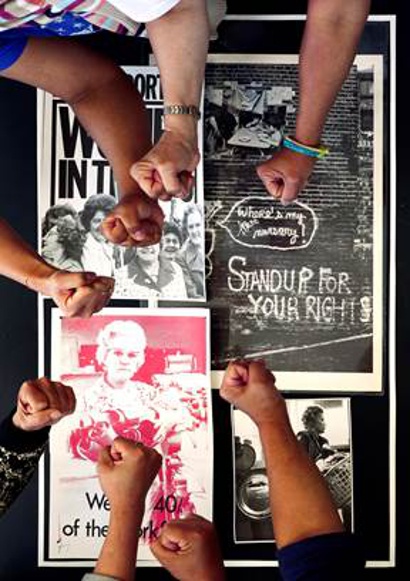Now You Can Go: On Social Reproduction
5 Dec 2015
Chaired by Emma Dowling, Senior Lecturer in Sociology, speakers include Justice for Domestic Workers Coordinator Marissa Begonia; co-founders of the critical/activist organisation Plan C, Camille Barbagallo and Nicholas Beuret (via Skype); Guardian journalist Dawn Foster; and art historian Larne Abse Gogarty. With an interruption by artist Pablo Pakula.
Speakers from the fields of art, activism, academia and journalism reflect on feminist efforts to transform the work of love and care, including historical struggles over housework and the wage, issues of migrant domestic labour and alternative potential models of collective care. They explore how the concept of social reproduction has become a key theme among anti-austerity movements. Acknowledging the usefulness of a critical framework that sheds light on various, under-valued, un/under-paid and often invisible life-sustaining activities, speakers discuss the relevance and potential of the lens of social reproduction today.
Larne Abse Gogarty is a London-based writer and lecturer, currently teaching in the art history department at University College London where she is also a member of the Centre for the Study of Contemporary Art steering committee. She received her PhD, entitled Rehearsals, Reproduction and the Art of Living: Historicising Social Practice in the United States from UCL in 2015. Her research focuses on the state and community formation in performance art and social practice. She is the author of recent articles including Wage Rage: How do Artists Making a Living, April 2015 and Art and Gentrification: The uses and abuses of social practice, February 2014, both in Art Monthly. Larne co-convenes the Marxism in Culture seminar at the Institute of Historical Research.
Camille Barbagallo has spent the last six years researching, writing about, and doing social reproduction. In her spare time she also works for PM Press. With Nicholas Beuret, she is co-founder of the Plan C and is currently living in upstate New York.
Marissa Begonia is a domestic worker and co-founder and coordinator of Justice for Domestic Workers (J4DW), the self-help group for migrant domestic workers and part of the hotel, restaurant and catering branch of the trades union Unite. She is author of the 2010 prize-winning essay Cry of a Migrant.
Nicholas Beuret works and writes on ecological catastrophe and the limits of the liberal imagination. He is a Fisher Fellow at Hobart & William Smith Colleges, New York, exploring gender and the Anthropocene. With Camille Barbagallo, he is co-founder of the Plan C and is currently living in upstate New York.
Emma Dowling is Senior Lecturer in Sociology at Middlesex University, London. With research interests in feminist political economy, gender and social reproduction, affective labour, financialisation and welfare state restructuring, crisis and austerity, social movements and social change, her work has appeared in academic journals such as Ephemera, Lateral, Cultural Studies – Critical Methodologies, Sociology, International Social Science Journal and Social Justice, as well as in newspapers, journals and magazines that include the FT, New Humanist, Red Pepper and OpenDemocracy.
Dawn Foster is a writer on politics, social affairs and economics for The Guardian, London Review of Books, Independent and Times Literary Supplement, and a regular political commentator for Sky News, Channel 4 News, and BBC Newsnight.
Pablo Pakula is a European mongrel, performance-maker and para-academic. In 2005 he co-founded Accidental Collective with Daisy Orton. This interdisciplinary performance company straddling theatre and live art creates studio pieces, interactive and site-specific performances, community/participatory events, and one-to-one experiences. In 2014 Pablo started his first solo project. Employing queer aesthetics, Masculine Expressions of my Creative Prowess, is a polymorphous performance piece exploring the multiplicity hidden behind the notion of masculinity. His recent international collaborations include Richard Schechner's Imagining O, a ‘dispersed-performance’ which collaged texts from Shakespeare’s women, particularly Ophelia, with Pauline Reage’s The Story of O.
Now You Can Go
This is part of Now You Can Go, a programme considering feminist thinking, art and activism taking place across several London venues in December 2015. Juxtaposing historical with contemporary positions, the series explores feminist concepts of generation and genealogy. It asks whether practices of consciousness-raising and collectivity might help us to combat the fragmentation, exhaustion and anxiety that we experience under networked capitalism. The programme draws inspiration from Carla Lonzi, the writer and cofounder of the Italian women’s liberation group Rivolta Femminile (Female Revolt), and her refusal of power and rejection of masculine creativity that exploits female supportive activity. This process of ‘deculturation’ entailed Lonzi’s withdrawal from her roles as an art critic, as a feminist leader, and from her relationship with her lover, the sculptor Pietro Consagra, which she documented in a dialogue between them called Vai pure (Now You Can Go).
Now You Can Go grows out of the Feminist Duration Reading Group which meets monthly at Space Studios in London. The programme has been developed by participants from the Feminist Duration Reading Group including Angelica Bollettenari, Giulia Casalini, Diana Georgiou, Laura Guy, Irene Revell and Amy Tobin, and is coordinated by Helena Reckitt with Dimitra Gkitsa.
When you buy tickets to more than one event in the Now You Can Go series, tickets are:
Full price tickets: £6
Concession/ ICA Members: £4
Student Member: £3





